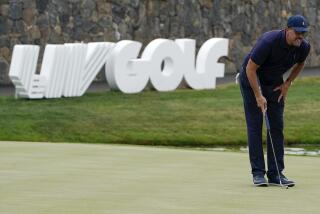TENNIS / JULIE CART : WTA Players Study Boycott at Australian Open
- Share via
First came the lightning flash of the announcement, then silence. Now, the sound of thunder. A storm is brewing in women’s tennis.
A few weeks ago, the Australian Open announced it was increasing the men’s prize money by 17%, but the women’s by only 6%. Officials explained the change as economically driven, saying men’s matches consistently earned higher TV ratings.
For a decade, the Australian Open had been awarding equal prize money. The announcement initially was met with little reaction, even though it left the U.S. Open as the only Grand Slam tournament that offers equal prize money.
The delayed reaction has been loud. Several players at the Oakland tournament two weeks ago spoke of organizing a boycott of the Australian Open in January. Six of the top 10 women players signed a letter to Open officials protesting what they view as a regressive move.
Ninth-ranked Lindsay Davenport, who is on the Women’s Tennis Assn. board of directors, said she supports the idea of a boycott to protest the change. “It’s a huge step back for women’s tennis,” she said.
Eleventh-ranked Mary Joe Fernandez also spoke out at Oakland, telling Reuters, “We have to unite and stick together on this issue. They [Tennis Australia] are supposed to be our partners. It’s unfair. Hopefully, they’ll change their mind.”
Parity in prize money at the four Grand Slam tournaments has been on the women’s agenda for decades, and boycotts have been suggested before. Seldom, though, have tennis players displayed enough solidarity to follow through on threats.
Marianne Werdel Witmeyer, newly elected president of the players’ association, understands how difficult it is to reach consensus in an individual sport, but says this is a unifying issue.
“ Everyone dislikes this,” she said. “The top players and the players ranked in the 100s. We’ve worked so hard to improve our game and improve our image, and now this is seen as a step backward. The players need to stand up and make a point; there’s no doubt about that.”
While disturbed about the change, WTA officials are equally alarmed that some players have suggested a boycott. The tour wants to do nothing that might displease its newly acquired title sponsor, which will get its first international exposure at the the first Grand Slam tournament of the season.
“That’s clearly a consideration,” said Karen Feldman, executive director of the players’ association.
The players, too, face commercial considerations that might erode their resolve. There are computer points to defend and a great deal of money at stake at Grand Slam events, and sponsors want their athletes wearing their shoes and swinging their rackets in an international spotlight.
Geoff Pollard, president of Tennis Australia, will meet with top players Tuesday in New York to discuss the situation. He has said the total prize money allocated to the women is non-negotiable, but the distribution of the money may well be changed at the players’ request.
Pollard’s position is painful to the WTA for another reason: He’s on the WTA tour board of directors and viewed as a “friend” of women’s tennis.
“Go back to 1984,” Feldman said. “The Australian Open had fallen on hard times. It was the poorest of the Grand Slams. The men weren’t going down to Australia and neither were the women. In order to entice the women, they offered equal prize money. The women began to support it and have ever since. The Australian has gotten back on top and has prospered. Now, it’s like ‘Thanks for nothing.’ ”
The WTA may well ask Pollard for hard numbers to back up his claim of lesser interest in the women, especially when next year’s event will offer the tantalizing matchup between Steffi Graf and Monica Seles. The tour might also point out that at the Australian Open, as with the French Open, the women frequently get the worst court assignments and are scheduled to play at times when there is no television coverage. It’s hard to create interest when the product is not displayed in front of the public.
More to Read
Go beyond the scoreboard
Get the latest on L.A.'s teams in the daily Sports Report newsletter.
You may occasionally receive promotional content from the Los Angeles Times.











